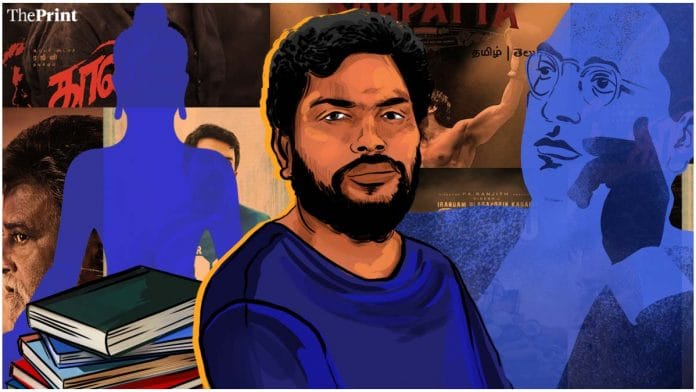Chennai: Before entering the Tamil film industry, actor-director Pa Ranjith had watched his people on screen — the lumpens, the goons, the drunks and the village idiots. When he did set foot in the industry in 2006, Ranjith was asked to not speak of his background and his identity, and above all the fact that he is Dalit. Inside, though, he was enraged by the stereotypes and the misrepresentation. It pushed him into the director’s chair.
“I decided to direct movies because my lifestyle, my people and my space were not being represented,” said Ranjith. “After so many years of independence, where is the space for Dalits in the mainstream? Especially in the cultural movement and arts?”
Ignoring the advice to cloak his identity, after over ten years and five films, he is known for his searing depiction of caste oppression in everyday life. For example in the film Kaala (2018), superstar Rajinikanth, playing the lead role, takes on a powerful Brahmin villain to protect his land rights.
But Pa Ranjith is not restricting himself to films — one library, one script, one news platform, one songwriter at a time, the 39-year-old is building a parallel cinematic universe. He is doing for Dalits what Oprah Winfrey did for Blacks in the US — making sure you don’t forget a whole population and relegate them to the margins. His office in Chennai has seen the who’s who of cinema, music and arts. You will also find rapper Arivu there — one of Ranjith’s finds and now on the Rolling Stone magazine cover — a library of must-reads, with ADs walking in and out.
Ranjith’s backdrops and sets also work to drive home his message: Icons of Buddha and Ambedkar in Sarpatta Parambarai, statues of Periyar and Mahatma Phule in Kaala, and Rajinikanth worshipping Buddha in Kaala. A lot can, and is, said without words. But Ranjith has been careful not to preach. The language of his films is mainstream.
“If my movie speaks my language, it will not reach people. A popular filmmaker has to connect with viewers first, and tell them that he is not different from them. My language has to resemble the movies, characters and lives that have entertained them so far,” he explained to The Indian Express.
Put another way, Ranjith is trying to revolutionise the mainstream, rather than create a counter-culture. But he is very categorical and has said in earlier interviews — “I don’t want to be known as a Dalit filmmaker.”
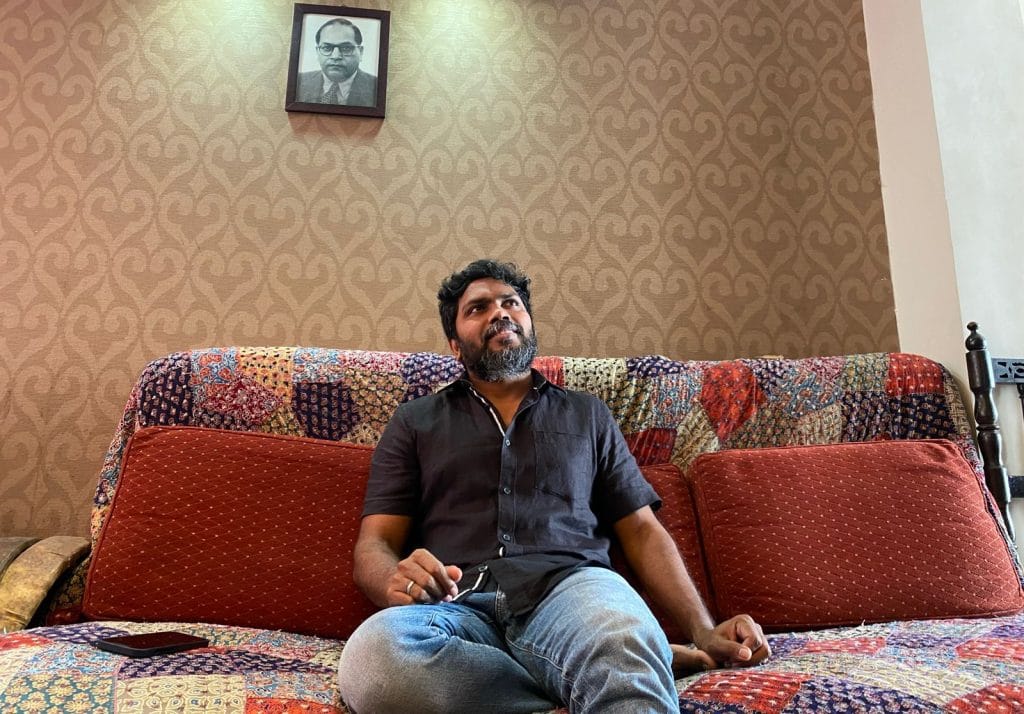
Also read: Lights, camera, caste – An Ambedkar photo made it to Bollywood after 38 yrs of independence
Route to films
Born in 1982, Ranjith grew up in the suburbs of Chennai in a one-room apartment built under a scheme by AIADMK founder M.G. Ramachandran. While he led a relatively sheltered life with respect to caste, Ranjith said he constantly questioned why shopkeepers refused to give him change in his hand or why he was given water separately. He ended up joining the Madras Fine Arts College to pursue a career in animation but was greatly influenced by his elder brother Prabhu, a lawyer associated with a Dalit organisation.
It was in college that he joined a film chamber and began watching a lot of world cinema. One of his favourite films that has influenced his direction immensely, in his own words, is City of God — a 2002 Brazilian crime drama that has been dubbed ‘the gangster film of the century’. Calling it the century’s most important films, Ranjith said the characters still haunt him, as a person and a writer. An eclectic set of movies make up his list of favourite films — Birdman (2014), Fandry (2013), Battle of Algiers (1966), and Parasakthi (1952).
He first started out as an assistant director on a film called Thagapansamy in 2006 and got his break when his friend Mani introduced Ranjith to newcomer producer C.V. Kumar — owner of a travel agency at the time — who produced Ranjith’s first movie in 2012, Attakathi. The movie became an even bigger venture when Studio Green, a prominent studio in the Tamil industry, came on board and bought the movie’s distribution rights. Studio Green also produced his next film Madras, post which actor Suriya approached him for a collaboration.
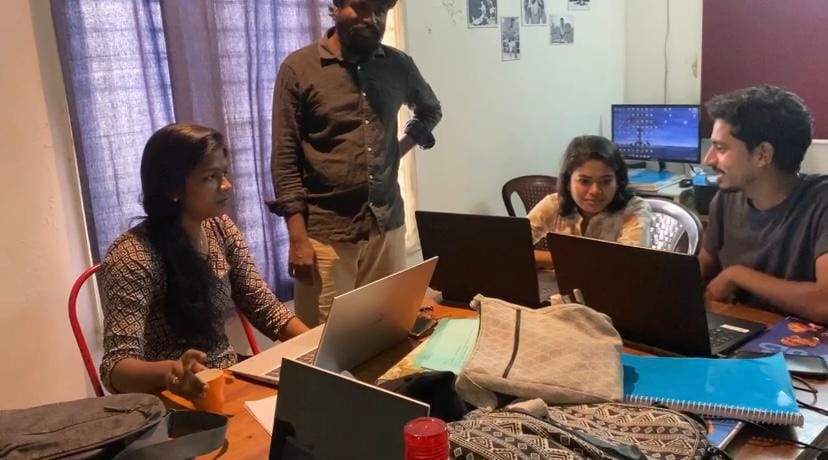
Also read: 2021 was the year of anti-caste cinema — from Jai Bhim to Karnan
ADs, bustling library, YouTube channel
With this notion of reaching out to people and speaking to them in their own language, Ranjith has now branched out to diverse mediums — books, short films, music, journalism, film festivals and so much more.
Besides being a director, Ranjith is also a producer and has launched movies like the recently released Writer, which focuses on caste brutalities in the police force. He will also present filmmaker Somnath Waghmare’s Chaityabhoomi, an upcoming documentary based on where Dr B.R. Ambedkar was cremated.
The office of Neelam Productions — his production house — in Chennai buzzes with assistant directors busy with post-production for Ranjith’s next film. Unlike most film offices, there are no movie posters but at the entrance is a huge bookshelf with multiple pictures and cartoons of Ambedkar and statues of Buddha.
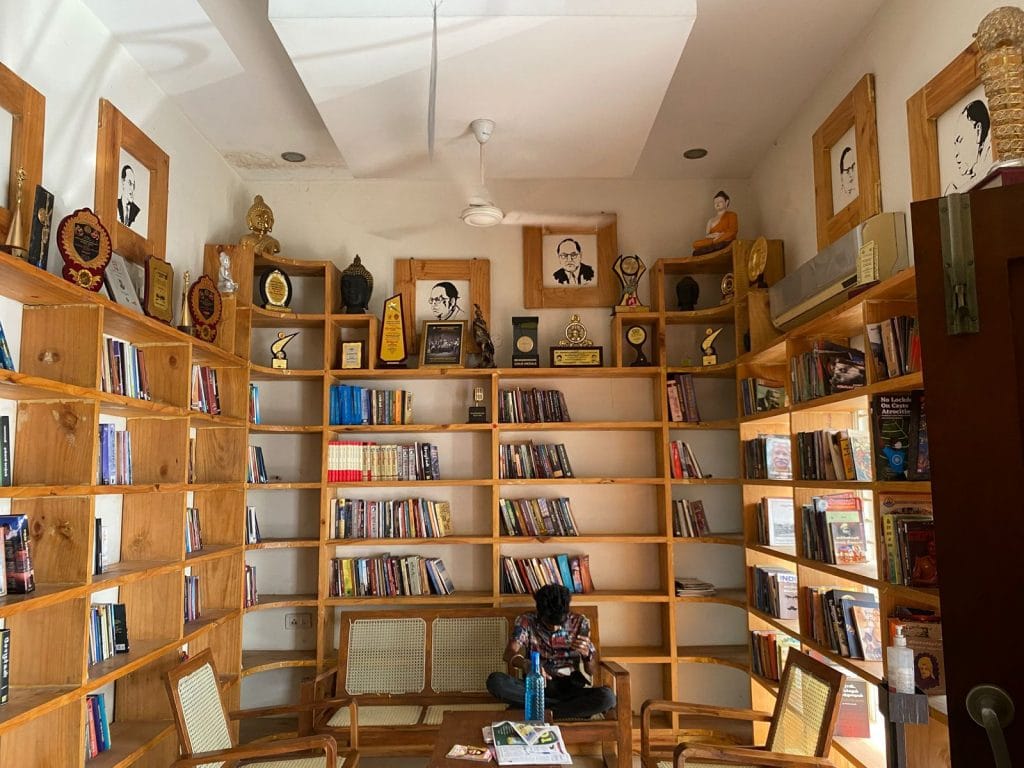
His ADs are not fearful of him nor are they intimidated by him but the reverence for Ranjith is evident in their demeanour. The AD room is the only one in the office full of movie posters, from Titanic to Gaspar Noe’s Love and La La Land. It also has a quote by boxer Muhammad Ali— someone who Pa Ranjith admires a lot — who was also referred to several times in Sarpatta Parambarai, a 2021 historical sports drama directed by him.
“I feel he was a social reformer and not only a boxer,” Ranjith explained in an earlier interview. “He was against racism, white supremacy and boldly wanted to retain his identity with his name Muhammad Ali. So, he stands out to be a great inspiration for many from the working class because they always felt connected with his macho looks, warrior spirit and also because of his skin colour.”
Not just through the production house, even his YouTube channel, Neelam Social, has platformed a lot of young talent, such as The Discreet Charm of the Savarnas by Rajesh Rajamani, which subtly brings out the prejudices of the dominant castes against Dalits.
With nearly 1,00,000 subscribers, Neelam Social’s driving force is “intersectional feminism” and bringing forward the “narrative of the common man”, according to its head of operations Priyanka Ulaganathan. A former architect by profession, Ulaganathan explained that it was the vision of Pa Ranjith that attracted her.
With shows on sex education, street politics, gender, ‘Ennada Politics Pandringa (What kind of politics are you practising), movie and book reviews — Neelam Social does it all to reach out to the youth.
The latest food show, Soru Paathi Story Paathi, highlights different food cultures and takes on contentious issues like the impact of beef bans on Dalits. One episode is about spending a day with fishermen, cooking with them and seeing what they eat. “The crux of this show is that oppression is invading our basic rights. And food is a basic right that provides us with nutrition,” said Ulaganathan.
There is a long line of people who wish to work with Ranjith. For those who manage to become his ADs and stick on with him for at least two-three films. Then there is 26-year-old Madheswaran, a civil engineering student, who oversees the library set up by Pa Ranjith.
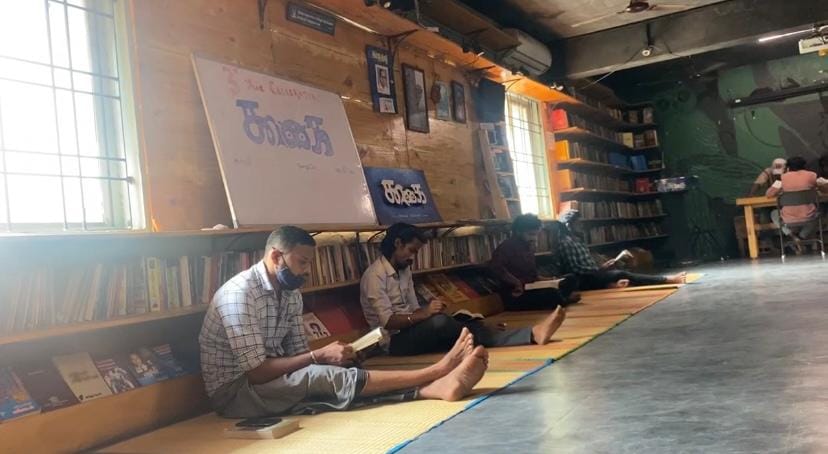
On the second floor of a seedy building in a narrow lane in Chennai is the Koogai Thiraipada Iyakkam, the library set up by Ranjith that is open all days of the week from 9 am to 9 pm. It has become a meeting place for aspiring assistant directors bridging the gap between literature and cinema. The collection of books at the library range from Chetan Bhagat and Karan Johar, to self-help books, biographies of Babasaheb Ambedkar and anti-caste leader C. Iyothee Thass and even books titled Dalitology.
“It has been my dream to work with Pa Ranjith. He is my favourite filmmaker. I want to make a movie on Tamils and the Dravidian movement. Hopefully through this, I can work with Ranjith anna soon,” says Madheswaran.
Also read: Ambedkar, Bachchan, caste, sport — Nagraj Manjule’s ‘Jhund’ says a lot by saying nothing at all
‘My life began the day I met Pa Ranjith’
It is perhaps the eye for detail and art that makes Ranjith so particular about the backdrops in his movies. In any movie, the livelihood and backdrop of a setting automatically set the tone for its politics, he explained. From a car in a village to the political flag planted, names of streets, how houses are constructed — everything contributes to the tale being woven.
“In India, one’s lifestyle or life is based on caste and symbolism, so we can tell the story with the symbol that you have in the background,” he said.
A brilliant example of this is the decision made by rapper Arivu, who is a member of the band formed by Ranjith ‘The Casteless Collective’ and composer of hit song Enjoy Enjaami, to incorporate Oppari, a dance form performed by marginalised castes and actual plantation workers, in the music video.
Just out of college, Arivu was studying to be an IAS officer with a secure future when he chanced upon Ranjith and the auditions for the band. Taken in by Ranjith’s personality and his advocation of Ambedkar’s ideology, Arivu said he decided to take up music professionally.
“My life started the day I met Pa Ranjith. It was through him that I understood the role of art and how my art could either make millions or touch millions,” says Arivu.
Formed in 2017, The Casteless Collective initially aimed to give prominence to gana, an instrument historically played by marginalised castes. However, now it has become a household name in Tamil Nadu combining different genres such as rap, hip-hop and rock. The lyrics are hard-hitting and challenge the status quo. For example, the lyrics of Quota, a rock number, goes: “Your forefathers kept mine oppressed, isn’t that why we are given our quotas”.
In a public performance of their Jai Bhim anthem, all the band members wore blue suits to set an example. While their latest song Vaiyulla Pulla (a feminist anthem) states: “Women are the eyes of this country, enough of looking at us now.”
Ranjith isn’t restricted to just art forms. He has also started a publication house that has platformed over 20 new Dalit and Muslim authors to date, most of whom were discovered via Facebook. The production house even offers a ‘Neelam Fellowship’ to new writers where each person selected gets Rs 75,000 per month.
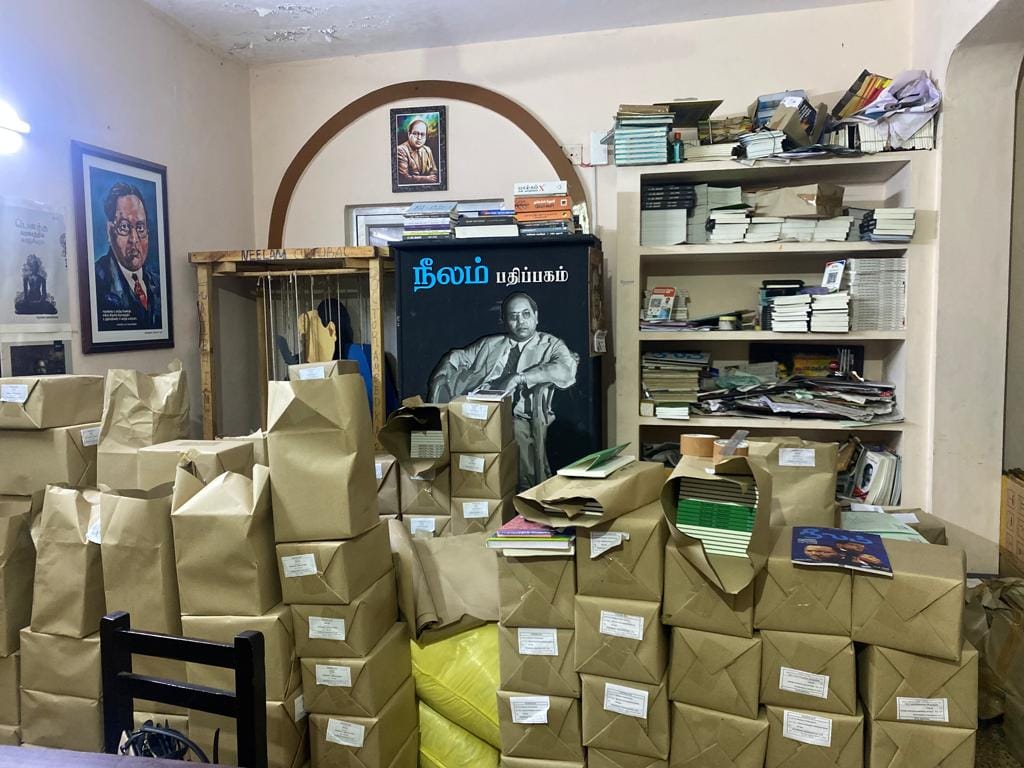
Working from the same office as the publication house is an online news platform started by him ‘Meirarivu’, which reports on Ambedkarite news and Dalit politics. Agathiyan V., 26, heads the two-member team that focuses on Dalit atrocities and Ambedkarite news. Besides news, the team focuses on social media strategy to enjoy traction and get more audience members.
“We report all that which is not covered by the mainstream media,” he explained dryly.
Having created this ecosystem, Ranjith is still looking at ways of expanding, from film festivals to book fairs. He is currently in talks with Karan Johar’s Dharma Productions to remake the movie he launched under his banner — Pariyerum Perumal. He will also finally make his Bollywood debut with a movie on tribal freedom fighter Birsa Munda. Ranjith also wants to team up with Marathi filmmaker Nagraj Manjule and dabble in projects in Marathi, Malayalam, and Telugu.
His philosophy is encapsulated by the following lines sung by Arivu – “I cannot force anyone to treat people equally, I can only make them realise that they are unequal.”



